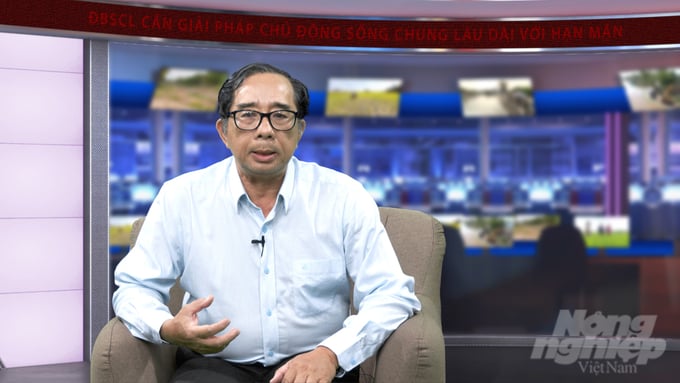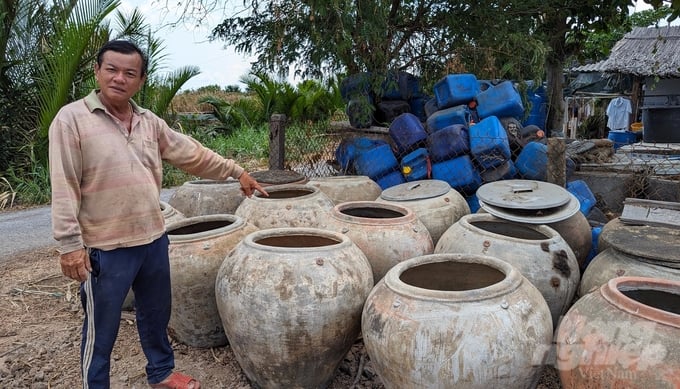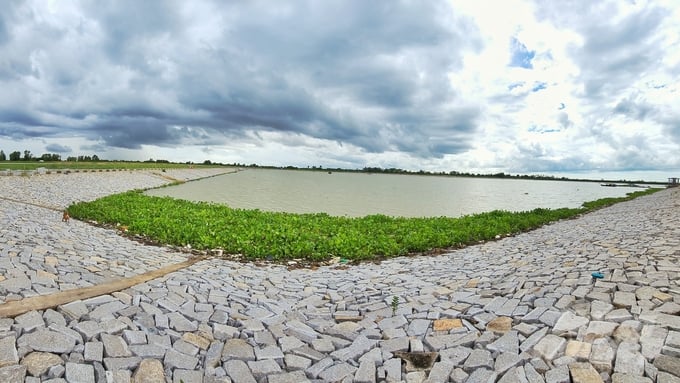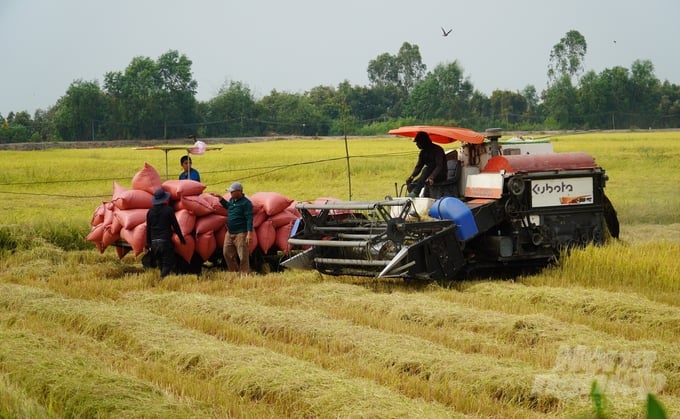June 20, 2025 | 08:08 GMT +7
June 20, 2025 | 08:08 GMT +7
Hotline: 0913.378.918
June 20, 2025 | 08:08 GMT +7
Hotline: 0913.378.918

Dr. Le Anh Tuan, senior advisor to the Institute of Climate Change Research (Can Tho University), shared at the seminar "The Mekong Delta needs proactive solutions to long-term living with drought and salinity" organized by Vietnam Agriculture Newspaper. presently. Photo: Kim Anh.
During the 4-year salinity cycle, the coastal areas in the Mekong Delta have encountered various difficulties due to drought and salinity in the dry season of 2023-2024.
Dr. Le Anh Tuan, Senior Advisor of the Climate Change Research Institute at Can Tho University, assessed the development of drought and saline intrusion in the Mekong Delta during the dry season of 2023-2024. This period is comparable to two previous instances of saline intrusion in 2015-2016 and 2019-2020.
In addition to affecting agricultural productivity and the livelihoods of people, saline intrusion poses considerable challenges in the supply of domestic water. In response to this issue, many regions have been forced to declare emergency due to the intrusion of saltwater into their local areas.
The damage to infrastructure, notably in provinces such as Tien Giang, Ca Mau, and Kien Giang, is far larger than in prior years, as seen by the subsidence situation.
Based on Dr. Le Anh Tuan's preliminary evaluation, salinity is currently penetrating more into the mainland and is higher compared to 2016 at certain monitoring locations.

Drought and saltwater intrusion have persisted in recent days, leading to local water shortages in some coastal localities in the Mekong Delta. Photo: Kim Anh.
Previously, the fruit-growing area of Ke Sach district in Soc Trang province and Soc Trang city, which have not experienced saline intrusion during the dry season, have been unaffected by saltwater. Additionally, Soc Trang city benefits from freshwater lakes throughout the year, further preventing the intrusion of saltwater. Nevertheless, both of these regions are currently being subjected to saline intrusion.
In addition, the excessive exploitation of groundwater has caused a decrease in the groundwater level, which has subsequently increased the probability of saline water into the aquifer.
"It is crucial to recognize that groundwater serves as a freshwater reserve in cases where there is a lack of rainwater, surface water is affected with salt, and the supply is diminishing. Only under these circumstances do we exploit groundwater. Current monitoring has shown indicators of salt in groundwater layers at depths between 150 and 500 meters. This is a highly concerning problem that poses a threat to the lives and livelihoods of people", Dr. Le Anh Tuan underlined.
Dr. Le Anh Tuan assesses that farmers have gained helpful lessons from past saline intrusion seasons, enabling them to develop effective strategies for dealing with the issue and ensuring long-term sustainability.
For example, in numerous coastal production regions, farmers have initiated the winter-spring crop ahead of schedule based on the guidance provided by authorities and experts. As a result, the majority of rice cultivation areas had finished harvesting by the end of February 2024, thus preventing any negative effects on agricultural productivity.

Freshwater reservoirs are one of the water storage solutions being built by localities in the Mekong Delta. Photo: Kim Anh.
Promoting water storage among individuals is crucial in the long run. During periods of scarce rainfall, farmers in regions with inadequate water resources may be recommended to halt output to reduce losses.
Dr. Le Anh Tuan proposes beginning small-scale community projects in villages and communes as a primary approach to address water management solutions. Once their effectiveness has been assessed, it is possible to contemplate investing in larger projects.
Concurrently, there is a need to enhance the enforcement and regulation of illegal wells. Wells that have licenses that have expired, are damaged, or contaminated with saline water must be filled in a meticulous manner, and the granting of permits for groundwater extraction should be limited.
Groundwater has been present in coastal regions for several centuries, and in some cases, even hundreds of years, gradually accumulating over time. If humanity continues to utilize that resource, it will ultimately be exhausted. Dr. Le Anh Tuan pointed out that freshwater beneath the groundwater layer will become saline and therefore unfit for use.

Thanks to proactively sowing seeds early and harvesting before saltwater intrusion occurs, the winter-spring rice area of localities in the Mekong Delta region avoids damage. Photo: Kim Anh.
Consequently, over time, coastal regions must artificially increase groundwater by adding freshwater during the rainy season. Implementing this approach requires substantial expenditures and meticulous performance, as the water being introduced into the groundwater must be free from impurities to avert soil layer contamination.
Dr. Le Anh Tuan suggests that it would be beneficial to implement water conveyance projects from provinces such as An Giang and the Dong Thap Muoi region to areas impacted by salinity in the water supply sector. In addition, the transportation of untreated water through pipeline networks to water treatment facilities in order to supply clean water to individuals aids in the reduction of groundwater depletion.
Translated by Linh Linh

(VAN) The waste of resources from agricultural by-products and the situation of counterfeit and poor quality goods in production causing losses of thousands of billions were pointed out by the National Assembly deputy.

(VAN) After 5 years of implementation, the CAI initiative has helped coffee growers change their farming practices, moving toward responsible agriculture that meets global export standards.

(VAN) The primary prerequisite for the comprehensive and robust integration of Vietnam's livestock sector into the global value chain is the establishment of a disease control system.

(VAN) The results of national programs are essential for establishing a contemporary livestock sector that is well-equipped to meet the demands of both domestic and international markets, with robust biosafety standards.

(VAN) The UNESCO Global Geopark revalidation of Non nuoc Cao Bang and the transition to a two-tier administrative model are presently undergoing a pivotal moment in Cao Bang, the northernmost province of Vietnam.
/2025/06/13/5330-2-004539_953.jpg)
(VAN) Changing policy mindset and removing investment barriers are urgent requirements to open up new development space for enterprises in the agricultural sector.

(VAN) The areas include the restoration of five million hectares of marine ecosystems.